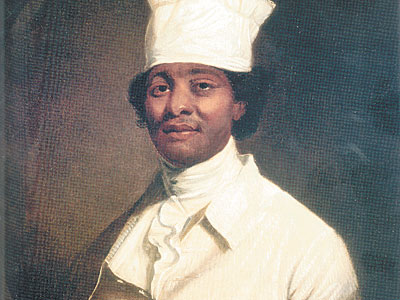(Note: This post was originally published in 2015, but has been updated.)
Hello Meltingpot Readers,

I had one of those driveway moments the other day when I heard a fascinating story on NPR. It was about Thomas Jefferson’s enslaved chef, James Hemings. Yes, the brother of Sally Hemings. James was apparently quite the culinary genius, so much so, that when Jefferson traveled to Paris for a five-year visit, he took James with him so he could learn the art of French cuisine. While there, James lived as a free man, and learned the secrets of French cooking and considered a bid for freedom. Check out the story on the NPR site and then tell me if you’re not moved.
Beyond Aunt Jemima and Uncle Ben
I’m so happy people are taking the time to tell individual stories about Black people in antebellum America. This is how we restore our humanity and this is how we encourage young people of all colors to recognize the true diversity of the Black experience in America. For example, by sharing James Hemings’ story, folks realize that our culinary legacy reaches beyond the limited notions of Aunt Jemima and Uncle Ben, two invented caricatures of servile Blacks cooking for America. But it is time we expanded the notion of what Black people were doing in America’s kitchens before (and after) the Emancipation Proclamation, besides stirring up pots of soul food.
Mind you, I love soul food and take pride in the foodstuffs that are considered “traditionally Black” – sweet potato pie is a Black thing – but I also know that Black chefs weren’t cooking soul food for their masters. How do I know this? Because I read. And because it doesn’t make sense that white masters were eating the food scraps they forced their slaves to eat. They were eating the delicious creations that their talented, enslaved chefs learned how to make using the fresh, expensive ingredients in the master’s kitchen. Hello, James Hemings! Here’s another NPR story that will continue this argument.
Keep Reading and Learning
In the meantime, I have to go eat lunch because I just made myself really hungry writing this post.
If you want to learn more about the true history of African-American cuisine and/or soul food, consider one of these two books: Soul Food: The Surprising Story of an American Cuisine, One Plate at a Time or The Cooking Gene: A Journey Through African American Culinary History in the Old South. And note, both of these books would make excellent holiday gifts for the foodie in your life.
Peace!

